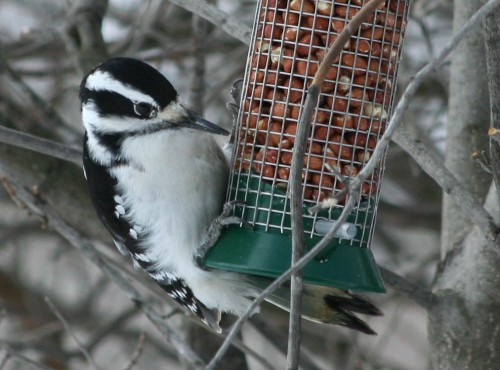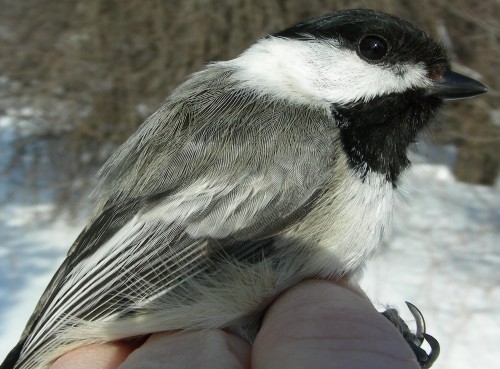|
|
|
WINTER
POPULATION MONITORING |
|
Week
18: February 27 - March 5, 2007 |
Welcome
to the McGill Bird Observatory weekly report. Click
here for a complete listing of our archives. Comments or questions are welcome at mbo@migrationresearch.org.
|
PICTURE OF
THE WEEK: |
|

The peanut feeder, courtesy of Andre and
Sophie, is proving to be pretty popular! Note
that this particular customer has yet to pay us a visit when the
nets are open...
(Photo by Greg Rand)
-
|
| |
THIS
WEEK |
THIS
WINTER |
2007
TOTAL |
SITE
TOTAL |
| #
birds (and species) banded |
5 (4) |
81 (9) |
19 (5) |
9337 (96) |
| #
birds (and species) repeat |
1 (1) |
27 (6) |
6 (2) |
1555 (52) |
| #
birds (and species) return |
1 (1) |
6 (1) |
3 (2) |
203
(26) |
| #
species observed |
20 |
48 |
28 |
180 |
| #
net hours |
4.0 |
85.0 |
19.0 |
14041.8 |
| #
birds banded / 100 net hours |
125.0 |
95.3 |
100.0 |
66.5 |
|
|
Note: table does
not include nocturnal banding (owls) |
Bander: Marie-Anne Hudson
Assistants:
Natalia Castellanos, Shawn Craik, Jean Demers, David Fishman, Sabrina
Gosselin, Gay Gruner, Betsy McFarlane, Greg Rand, Clemence Soulard
Notes:
Heavy snowfalls late in week 18 made the feeders very
attractive, giving rise to promising banding conditions. Unfortunately
the wind didn't agree and picked up after about 45 minutes of having set
the nets up, so they were quickly taken down. Still, we managed to band
5 individuals of 4 different species: House Sparrow, Slate-colored
Junco, Black-capped Chickadee and American Goldfinch, and had a return
Slate-colored Junco that was banded in late November. This suggests
that this young male has stuck around MBO throughout the winter, gorging
himself on our seeds.
The other weekly observations were pretty much
in-line with what we've seen this winter, with the exception of an
American Robin on Monday. Despite the deep snowdrifts, signs of spring
are beginning to appear with singing Northern Cardinals, an extremely
vocal Red-shouldered Hawk, and 3 unidentified icterids in the big dead
tree on Sunday. It is the first time in a while that we've recorded 20
species in a week. Hopefully the weather will give us a bit of a
break and let us gear up for the spring season, which is just around the
corner!

This little chickadee made us look twice. Chickadees are notoriously
difficult to age at
the best of times, and it really doesn't help when one side of the tail
indicates an
after-second year bird, and the other indicates a second-year bird. The
lesson of
the day: always look at the full tail!
(Photo by Marie-Anne Hudson)
|


